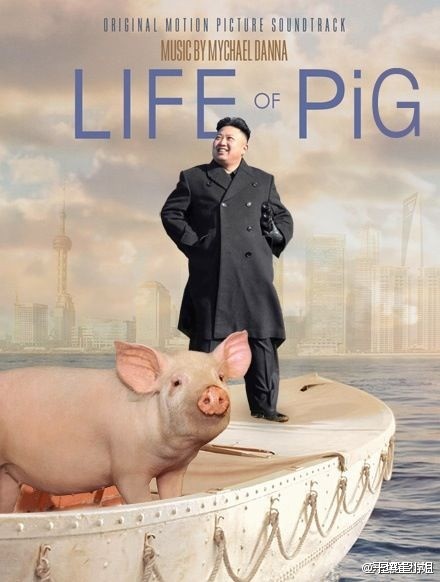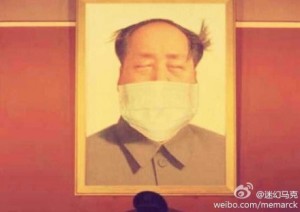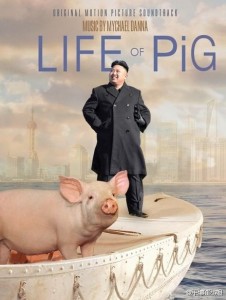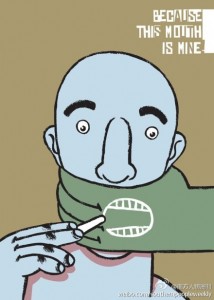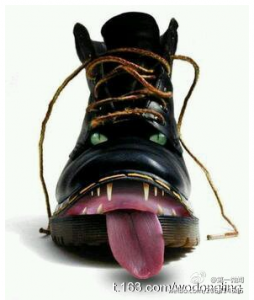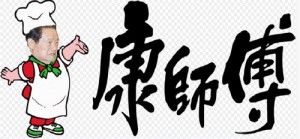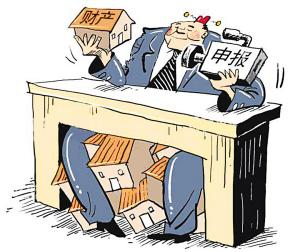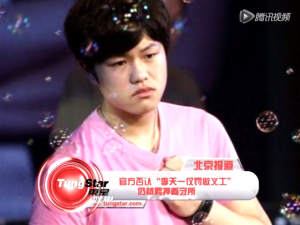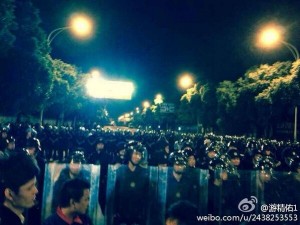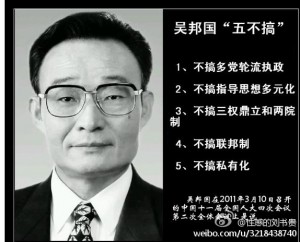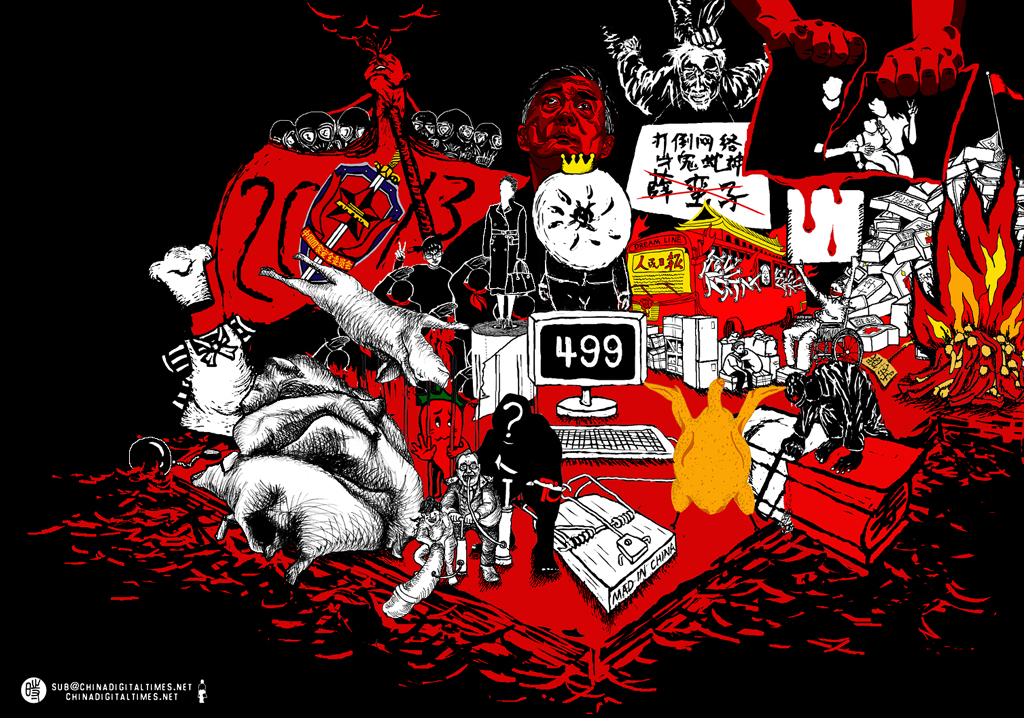
“The Raft of the Medusa 2013,” by Badiucao for CDT.
How do instant noodles and pork chop soup go together? They’re both Internet code words for important people and events from 2013. From disasters natural and man-made to political scandals, Chinese netizens talked about it all, creating memes and skirting censorship. Take our news quiz to test your knowledge of Internet language from the past year. Good luck!
Scroll down to reveal the answer and next question.
1. Cold weather intensifies air pollution, as many Chinese cities have learned the hard way. What did the Western press call the crippling smog in Beijing last winter, and again in Harbin in October?
A) Crazy bad
B) Smogmageddon
C) Airpocalypse
D) PM2.5
Answer: It’s C, airpocalypse. See smog the people.
2. “In Beijing, you can have free cigarettes,” the joke goes. “Just open the window.” The Shanghainese had a grim comeback last March: they could get free pork chop soup just by…
A) Collecting rainwater
B) Turning on the tap
C) Dumpster diving behind Carrefour
D) Writing a letter to pork producer Shuanghui International
Answer: B. More than 12,000 dead pigs were retrieved from the Huangpu River upstream from Shanghai, igniting fears among city residents about the safety of the tap water.
3. Journalists and editors from Southern Weekly protested after their new year’s call for constitutionalism was censored in January. A new word meaning “to be censored” was coined at this time. Where did the term come from?
A) The name of the paper
B) The name of the city in which the protests occurred
C) The name of the journalist whose byline graced the original article
D) The name of Guangdong’s provincial propaganda chief
Answer: D. Protesters called for propaganda chief Tuo Zhen to step down, but he still remains in office. Being “Tuoed” is no fun.
4. While delivering a speech in Moscow last March, President Xi Jinping lashed out at the international community’s tendency to criticize China’s path towards development. What metaphor did Xi use to drive his point home?
A) “Only the wearer of a shoe will know whether or not that shoe fits his foot.”
B) “It doesn’t matter if the cat is white or black; as long as it can catch mice it is a good cat.”
C) “The Chinese Dream can only occur if the people are heavily sedated.”
D) “Once you’ve boarded the train, there is no getting off.”
Answer: A. Xi followed his “fitting shoe” metaphor by saying “only the people of a country have the right to decide” if their country is on the right developmental path.
5. After news of a corruption investigative of Zhou Yongkang surfaced over the summer, netizens began to refer to the former high ranking Party leader as “Master Kang” (康师傅). Who or what does this nickname refer to?
A) A popular brant of instant noodles
B) Mao-era intelligence and security chief Kang Sheng
C) Confucius
D) Both A and B
Answer: D. Netizens have resorted to calling Zhou “instant noodles” when “Master Kang” was blocked from Weibo search results.
6. Online muckrakers found evidence that eventually led to Guangzhou urban management official Cai Bin’s sacking and an eleven-and-a-half-year prison sentence for accepting bribes. What was it that netizens uncovered about the corrupt official?
A) He owned a collection of designer watches worth far more than his official salary.
B) He owned 21 properties.
C) He had been taping his sexual encounters with prostitutes.
D) His son drove a collection of expensive sports cars.
Answer: B. Cai was legally entitled to one home–he went 20 over the limit. Netizens dubbed him “Uncle House.” If you chose A, you were probably thinking of Yang Dacai, a.k.a. Watch Brother. If you chose C, “sex-tape official” Lei Zhengfu, may have come to mind.
7. In 2009, the Chinese World of Warcraft forum thread “Jia Junpeng, your mother is calling you home for dinner” went viral. The meme has occasionally resurfaced when famous netizens were detained. Who was “called home for dinner” in July?
A) Ji Zhongxing, the man who detonated a homemade explosive at the Beijing airport
B) Activist Guo Baofeng (Peter Guo)
C) Ai Weiwei
D) Rock singer Wu Hongfei
Answer: D. Wu, the singer in the Beijing band Happy Avenue, was detained for several days for “making up false terrorism information” after she wrote on Weibo that she would like to blow up government housing commission offices. “Your mother is calling you home for dinner” has been sounded in other high profile detention cases.
8. 17-year-old Li Tianyi was arrested for his involvement in the gang rape of a bar hostess in February. While Li was eventually tried and convicted to ten years in prison, what was had state media earlier reported that led some to believe he may face a lesser charge?
A) A known voyeur, he didn’t have sex with the woman, but merely watched his friends.
B) He and his friends were with a prostitute who had consented beforehand.
C) He couldn’t have been involved with the rape, since he had been accused of assaulting an elderly couple with his BMW that same night.
D) He, along with four others, took turns having sex with a woman.
Answer: D. In June, a Xinhua report on Li’s imminent trial said he “took turns having sex.”
9. In the aftermath of which natural disaster did residents take to the streets in anger when official news downplayed the damage, only to be met with a crackdown by riot police?
A) Massive landslides in Yunnan
B) The South China Tornado in Guangdong
C) Typhoon Fitow’s touchdown in Zhejiang
D) A 6.6-magnitude earthquake in Gansu
Answer: C. As residents in Yuyao, Zhejiang were still submerged, official media reported that all had returned to normal. When authorities invested more into riot police than they had into relief efforts, a town disaster was born.
10. Which numbered policy list was blocked from Weibo in the lead-up to the 2013 National People’s Congress?
A) The five black categories
B) The five no’s
C) The four olds
D) The six assurances
Answer: B. “The five no’s” were originally laid out at the 2011 National People’s Congress by Wu Bangguo amid popular calls for liberal democracy.
How did you do? Keep up to date with CDT’s Grass-Mud Horse Lexicon, a glossary of China’s online “resistance discourse,” used to mock and subvert the official language around censorship and political correctness. Follow the Word of the Week for highlights from the Lexicon, and check out the Grass-Mud Horse eBook, our collection of must-know terms to follow the Chinese Internet.




